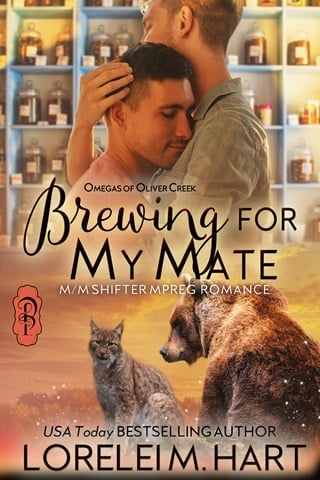Chapter Five
My poor bear. His disappointment every time our mate was not in the shop shook us both, and it was even more important for him that I break the habit of stalking the customers.
Mate.
No. Our mate is not there.
Mate.
In the past, I would have caved and given him what he wanted, but this time I did not cave. Instead, I stood up and put away the tea things. I’d packaged enough for now, and those could go out front to restock later.
But there was always something to do in our shop, and I’d never felt I was too good to do any job. We had been busy for the early rush, and while we did of course use to-go cups or fill travel mugs for our commuters, one of my first decisions in having a coffeehouse was to use real glassware and crockery. It held the dual purpose of being good for the environment and an opportunity to offer our customers a nicer experience. Personally I never drank out of plastic or steel or paper if something better was available.
And with our new tea sideline, I’d been having a great time picking out cups and saucers. The first customers we served in one of the mismatched not-quite antiques almost lost their minds. An elderly couple who had moved here to retire, they waxed rhapsodic about the tea shop they used to frequent in the city, and how they’d missed it. Glen fussed about the special care we had to take with the china, having to hand-wash them and how many were likely to break, but I’d found them in thrift stores, mostly, in nearby towns or online marketplaces, and tracking them down was a new hobby.
Also, only one had broken so far.
But the dishes that needed attending to at this point were mostly the more traditional glasses and restaurant crockery cups, thick white mugs like something from a 1940s movie. Unlike the teacups, they were not as old as they appeared, and they were nearly unbreakable. Matching plates for baked goods were equally as tough. Of course, we had various vessels for fancy drinks, but our “cup of joe,” just plain beautifully roasted and brewed, had garnered us a reputation far outside the city limits of Oliver Creek.
My business was something to be proud of.
Even if I never saw my mate come through that front door and walk up to the counter. The bell rang again, likely the customer who came in last leaving, and I relaxed a little, stacking cups and glasses and plates in the trays for the automatic dishwasher I’d been told I had to install when I opened. Opening the place had cost far more than I ever dreamed it would, and that requirement was the thing that almost stopped me. Somehow I’d missed that requirement when pulling permits and studying the things I needed. Opening on schedule was critical as well because I had been paying rent for four months while getting everything ready—and another month without income was not an option.
Through dumb luck, I learned about someone closing a Chinese restaurant in a nearby town who was also selling all their fixtures. Fingers crossed, I went and made an offer on the behemoth because I had no other choice. As I walked around it, I had strong doubts about the purchase, but what choice did I have? It was a low bid since it was “as is” and not even guaranteed to be in working order.
I’d been annoyed at not only the expense but making room for it, but it had more than paid for itself in saved time and not having to worry about whether the dishes were really clean. A few teacups were no big deal, but we went through a whole lot of the other things in a day.
Until the moment it wasn’t. That moment came after the bell rang again and my bear more than doubled his insistence that we go see. So much so that as I turned after loading the final tray and hitting the start button, I didn’t even notice at first when the hose broke loose. Not until it was spraying the whole back room with steaming water.
I jumped back, cursing.
 Fullepub
Fullepub 



